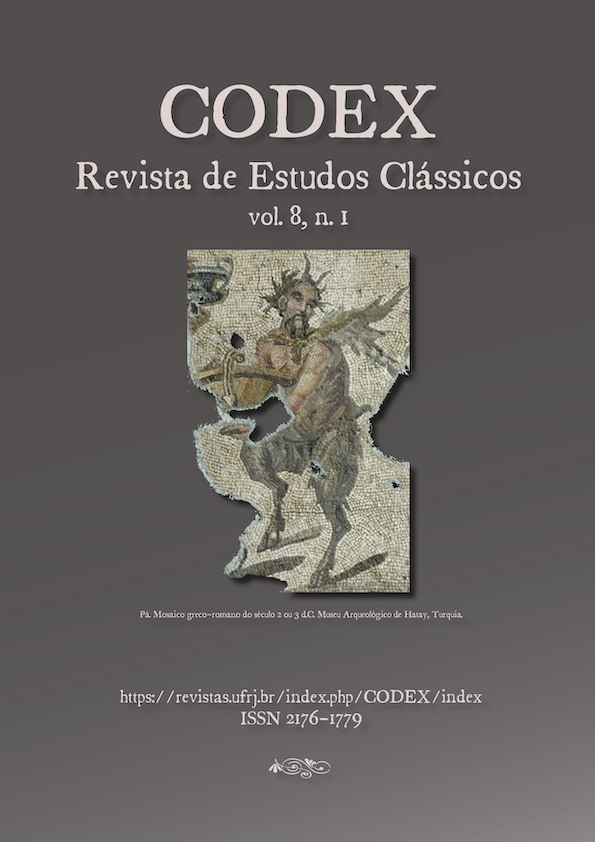Alcestis among the Female Characters in Euripides
DOI:
https://doi.org/10.25187/codex.v8i1.33014Keywords:
Alcestis, character, Euripides, Greek Tragedy, marriage, death, childrenAbstract
The present paper aims to examine the figure of Alcestis, in the homonymous play written by Euripides, Alcestis, as a character based on what she expresses in her brief participation on the stage, while still living. Alcestis takes part in the universe of female characters created by Euripides, and her particularity lies in the fact that she chose to die instead of her husband, Admetus. Some scholars tend to think that she acted like that for the love for her husband. In our study, we want to highlight that she made the decision more concerned with the future of her children, especially, thus demanding that would not she be replaced by another woman, rather than for a love reason. With this character, Euripides immerses us in the imaginary of what death was for the Athenians, and at the same time, enables us to investigate the legal issues related to marriage and resulting litigation and, in this specific case, to the inheritance of her children.
References
ARISTÓTELES. Póetica. Edicíon trilingue por Valentín García Yebra, Madrid: Editorial Gregos, 1974.
BURNETT, Anne Pippin. “The Virtues of Admetus”. In SEGAL, Eric. Oxford Readings in Greek Tragedy. Oxford: Oxford Clarendon Press, 1983, pp. 254-271.
DUYSINX, François. “Les passages lyriques dans l’ Alceste d’ Euripide. L’ Antiquité Classique 31, 1962, pp. 189-233.
EURIPIDES. Alcestis. Edited with Introduction & Commentary by L. P. E. Parker. Oxford: Oxford Clarendon Press, 2007.
EURIPIDES. Alcestis. With Notes and Commetary by. C. A. E. Luschnig and H. M. Roisman. Oklahoma: University of Oklahoma Press, 2003.
EURIPIDES. Opera. Cyclops, Alcestis, Medea, Heraclidae, Hippolytus, Andromacha, Hecuba. Tomus I. Edidit J. Diggle. Oxford: Oxford University Press, 1984.
EURIPIDES. Alcestis. Edited with introduction and commentary by A. M. Dale. Oxford: Oxford University Press, 1978 [1954].
EURIPIDES. Hippolytos. Edited with introduction and commentaries by W. S. Barrett. Oxford: Oxford Clarendon Press, 1964.
ESTEVE, J. Les innovations musicales dans la tragédie grecque. Nimes: La Laborieuse, 1902
GRUBE, G. M. A. The Drama of Euripides. London: Methuen & Co., 1973 [1941].
LESKY, A Tragédia grega. 2a. ed. Trad. Alberto Guzik. São Paulo: Editora Perspectiva, 1976.
LLOYD, Michael. The agon in Euripides. Oxford: Oxford Clarendon Press, 1992.
MARKANTONATOS, Andreas. Euripides’ Alcestis. Narrative, Myth, and Religion. Berlin/Boston: Walter de Gruyter, 2013.
MASQUERAY, Paul. Théorie des formes lyriques de la tragédie grecque. Paris: Librairie C. Klincksiec, 1895.
PATHMANATHAN, R. Sri. “Death in Greek Tragedy”. Greece & Rome 12, vol 1, 1965, pp. 2-14.
REHM, R. Marriage to death. The conflation of wedding and funeral rituals in greek tragedy. Princeton/New Jersey: Princeton University Press, 1994.
RIBEIRO JUNIOR, W. A. Enganos, enganadores e enganados no mito e na tragédia de Eurípides. Tese de Doutorado. São Paulo: USP, 2011.
ROMILLY, Jacqueline de. L’évolution du pathétique d’ Eschyle à Euripide. Paris: Les Belles Lettres, 1980.
SIFAKIS, G. M. “Children in Greek Tragedy”. Bulletin of the Institute of Classical Studies 26, 1979, pp. 67-80.
SANTOS, Fernando Brandão. “Eurípides, o Poeta do Feminino: o caso de Alceste”. In: SILVA, G. J. da e SILVA, M. A. de O. (org.) A ideia de história na Antiguidade Clássica. São Paulo: Alameda, 2017, cap. 4, pp. 91-113.
SANTOS, Fernando Brandão. “Quando Eurípides influencia Sófocles: um estudo sobre a estruturação da poesia trágica grega”. In: FACHIN, Lídia e DEZOTTI, Maria C. C. (Org.). Teatro em debate. São Paulo/Araraquara: Cultura Acadêmica/Laboratório Editorial, 2003, pp. 105-118.
SANTOS, Fernando Brandão. “O heroísmo no sacrifício ou o sacrifício do heroísmo? Uma leitura da Alceste de Eurípides”. Alfa 32, 1988, pp. 101-118.
SEGAL, Charles. Euripides and the Poetics of Sorrow. Art, Gender and Commemoration in Alcestis, Hippolytus, and Hecuba. Durham/London: Duke University Press, 1993.
Site citado:
Tribunal de Justiça Estado de São Paulo Especialidades, Família e Sucessões. Disponível em: <https://www.tjsp.jus.br/Especialidade/Especialidade/FamiliaSucessoes>. Acesso em: 04/02/2020.
Downloads
Published
How to Cite
Issue
Section
License
This work is licensed under a Creative Commons Attribution-NonCommercial 4.0 International License.










